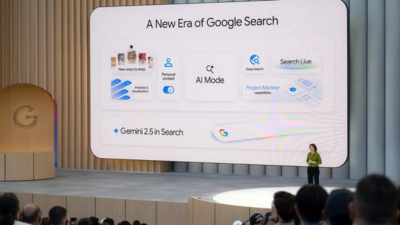Data played a starring role in the government’s successful antitrust suit against Google accusing it of illegally protecting its monopoly in online search. Now, steps to force Google to unlock its data trove could figure prominently in a ruling on how to address the tech giant’s dominance, antitrust experts say. On Friday, the federal judge overseeing the case, Amit P Mehta, heard closing arguments in federal court in Washington on what corrective measures, known as remedies, he should order to restore competition. The government’s requests include forcing Google to share its search engine results and advertising data with rivals. Justice Department lawyers have repeatedly described data as “the oxygen” for search engines. And in his ruling against Google in August, Mehta recounted in detail how the company harvests vast amounts of data from user searches and web crawling, then stores and analyzes the data to rule the lucrative market for internet search. Google, he noted, collects nine times as much user search data every day as all its rivals combined. And as more data is fed into Google’s software, the results that the search engine returns on everything from biology to bluejeans become more accurate and relevant to the person seeking information. Better search performance, in turn, attracts more users and more advertisers, Mehta wrote. It’s a flywheel that steadily enhances Google’s search and acts as a barrier to competition. “At every stage in the search process,” the judge wrote, “user data is a critical input that directly improves quality.” His decision on how to fix Google’s monopoly has the potential to reshape competition on the internet, particularly as a new age of generative artificial intelligence takes off and is expected to overhaul the way people search for information online. Tech companies are racing to win consumers over with chatbots and other tools that can answer more sophisticated questions, drawing from vast pools of data. Mehta has already indicated that AI may factor into his deliberations, noting during a recent hearing the rapid development of the technology since the lawsuit went to trial in the fall of 2023. To fix Google’s search monopoly, the Justice Department and the group of states that brought the case have recommended a range of sanctions, from simply prohibiting anticompetitive deals with companies that Google pays to make it the automatic search engine to forcing the company to sell off its market-leading Chrome browser. The government’s data-related proposal falls somewhere in between. It includes requiring Google to share user search information and license its search index, a database of hundreds of billions of webpages scored by popularity, quality and relevance. In late April, Mehta said he looked at his job as weighing actions across a “remedy spectrum.” At one end was a breakup order, he said, while at the minimalist end was a ban on illegal deals with browser and smartphone companies. In the middle were “forward-looking remedies,” he said, without elaborating on his thinking. Given the evidence in the case, a data-sharing order would be “a conceptually appropriate remedy,” since the exclusive deals increased Google’s data advantage, said Douglas Melamed, a former senior official in the Justice Department’s antitrust division and now a visiting fellow at the Stanford Law School. Still, a data-sharing project raises its own set of questions. In court testimony, Google emphasized the privacy concerns of passing user search data along to other companies. The government’s data proposal also calls for access to software that uses data as an ingredient but was built by Google’s engineers. “It looks like an administrative headache — how much data, how often, and access to Google’s crown jewel?” said John Yun, an economist at the Antonin Scalia Law School at George Mason University. Google has described the government’s data-sharing plan as the equivalent of a breakup — a forced surrender of its intellectual property, allowing competitors to reverse-engineer its technology. “The proposal on data sharing is so far-reaching, so extraordinary,” that it “feels like de facto divestiture of search,” Sundar Pichai, CEO of Alphabet, Google’s parent company, testified in court last month. The history of forced asset sharing as a solution for monopolistic behavior is mixed. In 1956, as part of an antitrust settlement with the government, AT&T agreed to license its patents, including for transistors, the tiny switches that are the building blocks of electronic circuitry. That opened the door to an independent semiconductor industry in what became Silicon Valley. But the Telecommunications Act of 1996, which was intended to increase competition for local telephone service by mandating that companies share network capacity, didn’t result in much innovation. Eventually, genuine competition emerged, but it came from mobile wireless and cable broadband companies, said Jon Nuechterlein, a telecom expert and former general counsel of the Federal Trade Commission. Landline voice service has fallen from nearly 100% of households in 1996 to about 25% today. “Outside competition emerged independent of all the regulatory churn,” said Nuechterlein, a distinguished scholar at George Washington University’s Competition Law Center. Today, AI is the big unknown in search. Chatbots like OpenAI’s ChatGPT and Anthropic’s Claude, the AI-powered search engine Perplexity, and others are potential Google disrupters. Google itself is investing heavily in AI-enhanced search, which Pichai recently described as “a total reimagining of search.” While Mehta has more recently acknowledged the rapid advance of AI, his ruling in August noted that the technology had yet to overtake traditional search. “AI has not supplanted the traditional ingredients that define general search,” he wrote. “Importantly, generative AI has not (or, at least, not yet) eliminated or materially reduced the need for user data to deliver quality search results.” Some antitrust experts say Mehta’s decision could affect search and AI. “The explosion of AI makes it even more important to have strong data-sharing remedies,” said Gene Kimmelman, a former senior official in the Justice Department’s antitrust division. “AI and search overlap, and both ride on data.”






